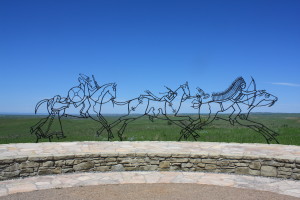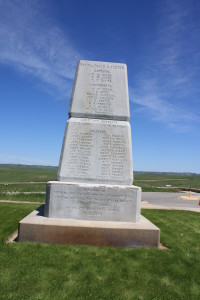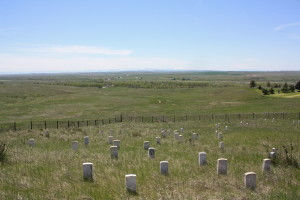CUSTERS LAST STAND – WHAT SHOULD I FEEL?
CUSTERS LAST STAND – WHAT SHOULD I FEEL?
By Chantal Cooke
I don’t know what to feel.
It’s a bright June day and I am at the Little Big Horn standing on the hill where Custer made his last stand.
The sun is warm on my back, a gentle breeze tussles my hair, pale yellow butterflies dance among the wild flowers, and kingbirds play hide and seek in the scrub.

I breathe in the fresh air and look out over the hills imagining what Custer’s men must have seen that fateful June day in 1876 when they were surrounded on all sides by Indians determined to mete out death.
Of the original 250 soldiers there are just 41 left, including Custer himself. The war cries of the Indians ring in their ears, arrows whistle past and the crack of guns echo across the hilltops. The smell of gunpowder and death fills the air. 200 soldiers lie dead or dying on the pale grassy slopes below them – their last cries piercing the ears of the final few. The 41 make their last stand. They shoot their horses and use them as shields to fend off the encroaching arrows. They know they cannot survive, death is inevitable but every minute is worth fighting for.

Do these young men pray for mercy? Do they whisper final farewells to loved ones many miles away sending their thoughts out into the wind hoping they may find a way home? Do they cower behind the horses waiting for the fateful arrow that will end their lives? We’ll never know but it’s clear those last few minutes must have been horrific. What must it be like to know that death is just moments away?
Should I feel sorry for them? Should I try to image their pain? Should I weep a silent tear and promise never to forget? Should I honour their memory with a moments silence and reflection? Probably I should. But it’s not so easy to do.
Having spent the last week driving across the USA, reading the guide books, visiting places like Wounded Knee, the Crazy Horse memorial, and Pine Ridge Reservation and researching each place I visit to fully appreciate its history and significance as well as its beauty, I find myself sympathising with the American Indian.
The white settlers arrived uninvited, they wrenched the land from the Indians, they made promises which they broke – time and time again. In their lust for land and for gold they set about systematically trying to rid this continent of its native inhabitants – once and for all. They didn’t just kill the fighting men, they massacred women and children, and they slaughtered the Buffalo herds – with the aim of depriving the “hostiles” of their food source. Today we’d call it genocide.

Those they couldn’t kill they herded onto reservations forcing these nomadic hunters to become farmers on land that wasn’t suitable for crops; another attempt to kill their spirit even if they couldn’t kill their bodies. Places like the depressingly poor Pine Ridge Reservation are the legacy of those cruel policies.
And the cruelty didn’t stop there – children were forcibly removed from their parents and sent to boarding schools many miles away. The aim was to “civilise” them but it also served to break the bond between the children and their tribe, fragmenting the people and their culture still further.
And Custer was one of them. On that June day over 100 years ago Custer and his men set out with death on their mind – the death of Indians. Custer’s mission was to kill all the Indians he had discovered camped along the Little Bighorn River – including the women and children.
So do I feel sorry for Custer and his men as they watched death approach them? Of course I do – it would be inhuman not to. But I also feel for those last few Northern Plains Indians fighting for the right to live as they had always lived, not just fighting for their own lives, but for a way of life. They may have won the battle that day but sadly less than 20 years later they finally lost the war.

About the Author:
Chantal Cooke is an award winning journalist and broadcaster with a passion for the planet. In 2002 she co-founded the award winning radio station PASSION for the PLANET and in 2009 Chantal was awarded London Leader in Sustainability status. Chantal also runs a successful communications agency – Panpathic Communications.
